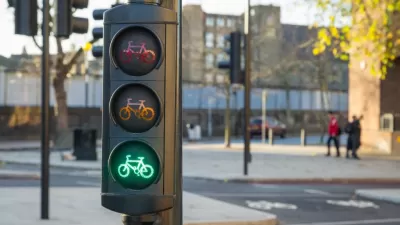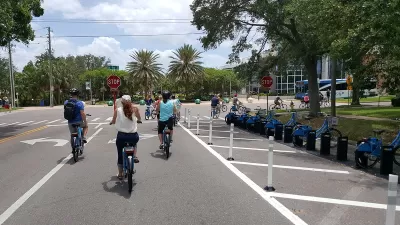Greg Beato enumerates how American bike-sharing programs fall short of their Parisian counterparts. Until the program evolves some more, the autonomy afforded by the private car or bicycle will continue to prevail.
"In giving up some of the autonomy you'd enjoy if you simply rode your own bike, you get other significant benefits in return, right? Well, someday perhaps. One thing that makes bike-sharing programs attractive, in theory at least, is that the bikes aren't yours. Bike theft is rampant pretty much everywhere there are bikes, and secure places to lock your trusty steed, especially for hours at a time, are exceedingly rare.
Offloading the risk of theft to a bike-sharing program makes sense-but in the case of SmartBike D.C., there's only so much risk you can offload. When a bike is safely locked in a docking station, you aren't responsible for anything that happens to it. Unlike Paris, however, D.C.'s docking stations are far from ubiquitous and aren't likely to achieve that state any time soon. (And even in Paris, bike theft remains a problem. Approximately 3000 Velib bikes were stolen and another 3000 vandalized during the program's first year of operation-some Velib bikes have reportedly been spotted as far away as Casablanca.)
In the case of SmartBike, if you want to run an errand in a part of the city where there are no official docking stations-aka most parts of the city-you assume the liability when you lock up the bike. If someone steals it on your watch, you owe SmartBike $550. If someone vandalizes it, you owe SmartBike however much it decides to charge you for the necessary repairs."
FULL STORY: My Other Bike is a Public Transportation System

Alabama: Trump Terminates Settlements for Black Communities Harmed By Raw Sewage
Trump deemed the landmark civil rights agreement “illegal DEI and environmental justice policy.”

Study: Maui’s Plan to Convert Vacation Rentals to Long-Term Housing Could Cause Nearly $1 Billion Economic Loss
The plan would reduce visitor accommodation by 25% resulting in 1,900 jobs lost.

Planetizen Federal Action Tracker
A weekly monitor of how Trump’s orders and actions are impacting planners and planning in America.

Waymo Gets Permission to Map SF’s Market Street
If allowed to operate on the traffic-restricted street, Waymo’s autonomous taxis would have a leg up over ride-hailing competitors — and counter the city’s efforts to grow bike and pedestrian on the thoroughfare.

Parklet Symposium Highlights the Success of Shared Spaces
Parklets got a boost during the Covid-19 pandemic, when the concept was translated to outdoor dining programs that offered restaurants a lifeline during the shutdown.

Federal Homelessness Agency Places Entire Staff on Leave
The U.S. Interagency Council on Homelessness is the only federal agency dedicated to preventing and ending homelessness.
Urban Design for Planners 1: Software Tools
This six-course series explores essential urban design concepts using open source software and equips planners with the tools they need to participate fully in the urban design process.
Planning for Universal Design
Learn the tools for implementing Universal Design in planning regulations.
Caltrans
Smith Gee Studio
Institute for Housing and Urban Development Studies (IHS)
City of Grandview
Harvard GSD Executive Education
Toledo-Lucas County Plan Commissions
Salt Lake City
NYU Wagner Graduate School of Public Service




























